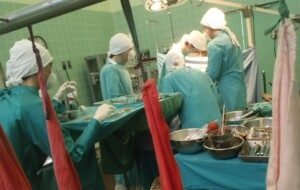Can the transplant of an esophagus from an organ donor cure esophageal cancer?
Or is treatment limited to replacing portions of a diseased esophagus with pieces of intestine or plastic tubing?
We commonly hear of transplants for the following organs: heart, lung, liver, kidney, pancreas and intestines.
In fact, double and even triple transplants can be done, such as a heart-liver-kidney procedure.
So what, then, about an esophageal transplant?
If you’ve googled this, there will be search results – but there’s a problem with those search results.
“Esophageal transplant is used inappropriately when what is meant is esophageal replacement,” says Alex Little, MD, a thoracic surgeon with a special interest in esophageal and lung cancer.
Don’t let all those “esophageal transplant” search results mislead you.
Dr. Little has many years of experience performing surgery on people with esophageal cancer.
He explains, “When a surgeon removes some of the esophagus, most frequently for cancer, by performing an esophagectomy, he or she has created a gap between the remaining esophagus, coming down from the pharynx, and the stomach.
“This gap is closed most frequently by advancing the stomach into the chest or neck where it is reconnected to the esophagus by either a suturing or a stapling technique.
“Portions of the large or small bowel also can be used. This constitutes replacing the esophagus with an interposition of stomach, small intestine or colon.
“These interposition alternatives for esophageal replacement are not transplants of someone else’s esophagus.”
Incorrect terminology aside, this still leaves a big question: CAN an actual transplant of an entire esophagus, from a donor, be executed – and if so, can it cure esophageal cancer, which has a very poor prognosis?
Dr. Little explains, “While I can imagine that an actual esophageal transplant is theoretically possible, it seems fraught with insurmountable obstacles as well as being unnecessary — as we have the interposition options described above.”
Obstacles to Making Actual Esophageal Transplant a Reality
“There are multiple reasons why the concept of transplanting an esophagus is unlikely to come about,” begins Dr. Little.
“The first is that there is no demand, as reconstruction techniques as described above are available.”
A replaced portion of the diseased esophagus, with parts of the patient’s intestines or stomach, gets the job done (moving food) as well as would a donor’s esophagus – and without the need for lifelong immunosuppressant drugs which, ironically, would raise the risk of other cancers.
“Another is that a patient with esophageal cancer can’t wait around hoping for a donor to arrive, and a living donor is not realistic — how would the donor eat after donating their esophagus?
“Patients who have received a transplant of any organ must take immunosuppressive medications so their immune system does not kick into high gear and reject the transplanted organ.
“Our mouths contain infective bacterial strains which are in the saliva which we swallow all day long.
“Couple a suppressed immune system with constant bacterial exposure, and the likelihood of infection seems likely.
“Although all the techniques for reconstruction are somewhat surgically complicated operations, a transplant would be even more so, as it would require an anastomosis (a surgical connection) of the small blood vessels of the transplanted esophagus to small blood vessels of the recipient.
“Microsurgery would be required and, though possible, increases the degree of difficulty of reconstruction and participation of a plastic surgeon skilled in this technique.”
In short, an esophageal transplantation just does not make any sense – never mind the routine transplantations of other organs such as the heart and kidneys.
But wouldn’t an esophageal transplant – despite its complicated nature – cure esophageal cancer?
Esophageal cancer has a five-year survival rate of around 20 percent, according to the National Cancer Institute Surveillance and Epidemiology End Results Program.
It’s easy to wonder about desperate measures to cure this awful disease.
But Dr. Little explains, “The ability to transplant an esophagus would not contribute to the ability to cure an esophageal cancer — as that is dependent on the stage of the cancer and the patient’s response to treatment which usually is multimodality.”
So, for instance, what good would a transplanted, perfectly healthy esophagus do, if the cancer has already set up real estate in other areas of the body such as the lungs, liver, bones and brain?
When esophageal cancer is diagnosed based on symptoms rather than an incidental finding on an imaging study for an unrelated concern, it has already spread in nearly every case.
In a very rare instance in which the cancer is detected while it’s still confined, an esophageal transplant – which hasn’t even ever been done – would be inferior to the current interposition options.
“Surgical resection (esophagectomy) is always a component, and the others are a variable combination of chemotherapy, radiation and, increasingly, immunotherapy,” says Dr. Little.
“The availability of an esophagus to transplant would simply add to the reconstruction alternatives after the curative esophagectomy has been completed.”
 Alex Little, MD, trained in general and thoracic surgery at the Johns Hopkins University School of Medicine; has been active in national thoracic surgical societies as a speaker and participant, and served as president of the American College of Chest Physicians. He’s the author of “Cracking Chests: How Thoracic Surgery Got from Rocks to Sticks,” available on Amazon.
Alex Little, MD, trained in general and thoracic surgery at the Johns Hopkins University School of Medicine; has been active in national thoracic surgical societies as a speaker and participant, and served as president of the American College of Chest Physicians. He’s the author of “Cracking Chests: How Thoracic Surgery Got from Rocks to Sticks,” available on Amazon.
 Lorra Garrick has been covering medical, fitness and cybersecurity topics for many years, having written thousands of articles for print magazines and websites, including as a ghostwriter. She’s also a former ACE-certified personal trainer.
Lorra Garrick has been covering medical, fitness and cybersecurity topics for many years, having written thousands of articles for print magazines and websites, including as a ghostwriter. She’s also a former ACE-certified personal trainer.
.
How Likely a Stuck Food Feeling in Chest Is Esophageal Cancer?















